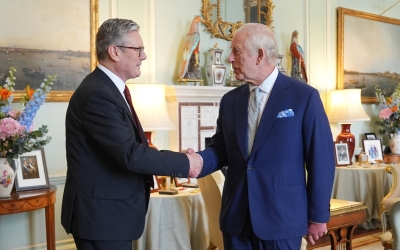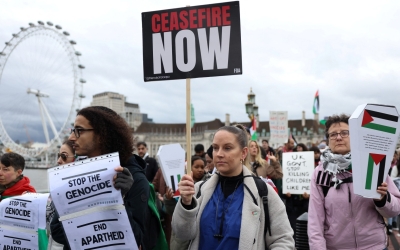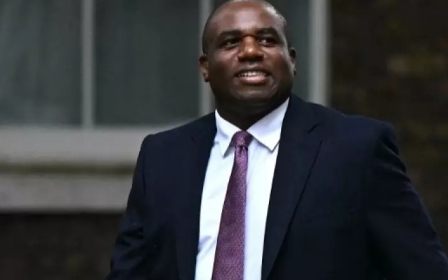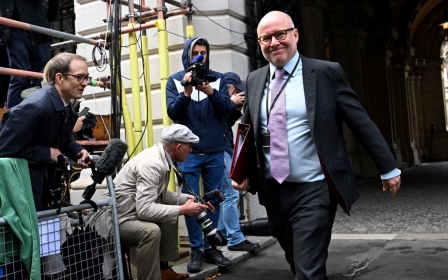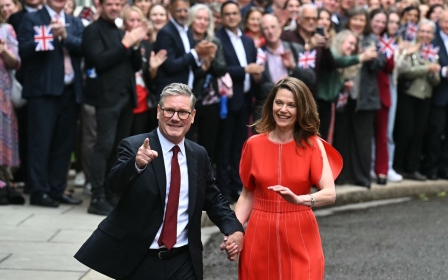UK: Would a 'Melenchon-like' electoral alliance have cost Labour more seats?
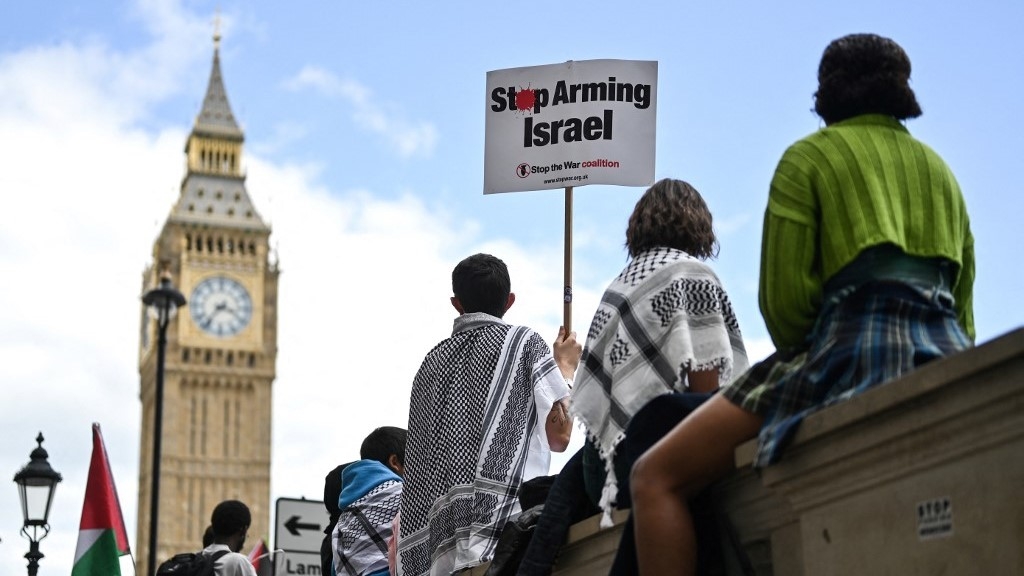
Several seats in the UK general election last week saw rival pro-Palestine, anti-Labour candidates splitting the vote between them - handing the Labour Party a series of narrow wins.
What would the effect of an organised independent-left electoral alliance against the Labour Party have been?
Consider France. In the first round of the recent parliamentary elections there, Marine Le Pen’s far-right National Rally came out on top.
But in the second round on Sunday 7 July, the tables had turned and Le Pen’s party found itself in third place with 142 seats.
The reason: the New Popular Front (NPF), an electoral alliance of Socialists, Greens, Communists and the hard-left France Unbowed.
New MEE newsletter: Jerusalem Dispatch
Sign up to get the latest insights and analysis on Israel-Palestine, alongside Turkey Unpacked and other MEE newsletters
The NPF brought disparate left-wing parties together in an alliance that forestalled vote-splitting and staved off the far right. The alliance even defeated President Emmanuel Macron’s centrist alliance, which ended up with 148 seats - in second place to the NPF’s 177.
Two days before that in the UK, Keir Starmer’s Labour Party had won the general election by a landslide, ending up with 412 out of 650 parliamentary seats.
Despite this overall success, the party faced a serious revolt from many of its traditional supporters.
Five independent candidates were elected on pro-Gaza platforms. One was the former Labour leader barred from standing for the party, Jeremy Corbyn, who trounced his Labour challenger.
Another was Ayoub Khan, who pulled off a shock win against Muslim Labour MP Khalid Mahmood in Birmingham Perry Barr.
Shadow cabinet minister Jon Ashworth lost his seat to newcomer Shockat Adam in Leicester South, while Blackburn - represented by a Labour MP for 69 years - saw a win for independent Adnan Hussain.
Then there was Iqbal Mohamed in Dewsbury & Batley, who won with over 40 percent of the vote, while Labour’s Heather Iqbal came a distant second, with 22.9 percent of the vote.
And Carla Denyer, co-leader of the left-wing Green Party, unseated Labour’s Thangam Debbonaire on a pro-Gaza platform in Bristol Central.
Meanwhile, Starmer himself saw his vote share slashed by 17 percent from the 2019 election by pro-Gaza independent Andrew Feinstein in Holborn & St Pancras.
Several Labour incumbents retained their seats, but only narrowly - with previously large majorities slashed.
In these cases the pro-Palestine, anti-Labour vote was often split between multiple candidates.
And that raises the question of whether Labour could have suffered much heavier losses if pro-Gaza candidates had formed a tactical alliance, as left-wing parties did in France.
'Sensible, desirable and likely'
James Schneider is communications director for the left-wing Progressive International and former spokesperson and head of strategic communications for Labour under Jeremy Corbyn.
He told Middle East Eye that the French left alliance “doesn’t have the direct read across to the UK some people are jumping on.
“But an electoral pact at the next election seems sensible, desirable and likely.”
Before the election, prominent left-wing journalist Owen Jones set up a campaign called We Deserve Better backing “socialist candidates”, saying this was “safe in the knowledge that there’s no risk of the Tories getting back into government”.
'An electoral pact at the next election seems sensible, desirable and likely'
- James Schneider, Progressive International
Writer and broadcaster Richard Seymour told MEE he thought this strategy was a “mistake”, and that the left “should have been more aggressive and tried to unseat Labour candidates”.
That was the strategy adopted by another campaign, The Muslim Vote (TMV), which backed pro-Palestine candidates, both independents and from a range of parties - although not Labour or the Conservatives. The five elected independents had all been endorsed by TMV.
The campaign endorsing a candidate in a given constituency, though, did not mean that rival pro-Gaza candidates stood down.
In some constituencies, the presence of multiple independent candidates running on similar platforms secured Labour wins.
One was Birmingham Hall Green and Mosely, where the Labour incumbent Tahir Ali won with 12,798 votes. Independent Shakeel Afsar received 7,142 votes, while another independent, Mohammad Hafeez, received 6,159.
If there had been only one independent candidate, Labour would likely have been toppled in the constituency.
More common was vote splitting between independents and other parties - especially the Greens.
Consider Ilford North. Key Starmer ally Wes Streeting, now Britain’s health secretary, won by a tiny margin of 528 votes, his previous majority of 5,000 slashed by the 23-year-old British-Palestinian independent Leanne Mohamad.
But the Greens received 1,794 votes. If the party had stood down its candidate there, Mohamad might have won.
Another was Bethnal Green and Bow in east London. Early on in the election, one independent candidate - Tasnime Akunjee - stood down to give another independent, Ajmal Masroor, a clear run at unseating Labour’s Rushanara Ali.
In the end, Ali clung on with 15,896 votes, while Masroor received 14,207, coming just 1,689 votes shy of winning.
The Green candidate Phoebe Gill received 6,391 votes, while the Liberal Democrat got 4,777.
While it’s unlikely that all of those votes would have otherwise gone to Masroor, it remains reasonable to assume that a significant number of them were anti-Labour protest votes, and could have secured Masroor’s victory.
Meanwhile in Bradford West the anti-Labour vote was split three ways. Labour’s Naz Shah, who won with 53 percent of the vote in 2019, kept her seat with only 32 percent, receiving 11,724 votes in total.
Independent Muhammed Islam ended up in a close second with 11,017 votes, 30 percent of the total.
Another independent, Akeel Hussain, picked up 3,547 votes - and Green Party candidate Khalid Mahmood received 3,690.
Here as well, if there had been only one pro-Gaza candidate, he might have won.
Is an alliance possible?
Not every voter looking to punish Labour over Gaza, however, would have been equally willing to vote for all pro-Palestine candidates.
Take Birmingham Yardley: high-profile “TikTok Gaza lawyer” Akhmed Yakoob stood as an independent against Labour’s Shabana Mahmood, who won with 15,558 votes, and came in second place with 12,137 votes.
It’s easy to assume that if the Green candidate Zoe Challenor - who received 3,478 votes - had stood down, Yakoob could have won.
But many of those Green voters would have been unwilling to vote for Yakoob, who was widely criticised for joking about domestic abuse and praising Andrew Tate.
'Perhaps a French-style New Popular Front, where different organisations and independents cooperate based on a shared minimum agenda, would be a useful format'
- Richard Seymour, writer and broadcaster
The Green Party is a broad umbrella but it has generally socially liberal policies. Not so with all the pro-Gaza independents. Along with the fact that the Greens have a clearly defined environmentalist platform, this makes it unlikely that the party would have stood some of its candidates down.
Alliance-building seems particularly unlikely in the case of George Galloway’s socialist Workers Party of Great Britain (WPGB), which failed to win any seats. Galloway himself was unseated in Greater Manchester’s Rochdale by the Labour candidate.
The party is not just socially conservative but is outright hostile to the Green agenda on climate change.
“Given the WPGB’s reactionary views on climate change as well its deliberate manipulation of the culture war,” anthropologist and researcher Phillip Proudfoot said, “it is practically impossible for Greens to align with their candidates.
“Unfortunately the WPGB has chosen to advance policies that would exclude it from any possible alliance, as much as I admire George Galloway’s persistent support for peace and justice in the Middle East.”
At the same time, many people who vote Green might be unwilling to vote for independents. “We do not know if Green voters would have voted for Labour in constituencies where there was also a pro-Gaza independent,” Phillip Proudfoot told MEE.
“In some cases without a Green, this could potentially have helped Labour over the line.”
In Birmingham Yardley, the Workers Party candidate Jody McIntyre came close to defeating Labour’s Jess Phillips on 10,853 votes (Phillips won with 11,275). The Green candidate, Roxanne Green, picked up 1,958 votes - but it’s doutbful that many of them would have gone to the Workers Party if Green had stood down.
It was a similar situation in Birmingham Hodge Hill, where the Workers Party’s James Giles came within a thousand votes of unseating Labour’s Liam Byrne, who received 10,655 votes. Green Party candidate Imran Khan received 2,360.
Notably, many Muslim voters who are pro-Gaza are also critical of the Workers Party because of Galloway’s alleged sympathies with Bashar al-Assad and denial of China’s persecution of the Uyghur Muslims.
However, the left alliance in France involved parties setting aside their differences to unite in order to defeat the National Rally.
Could a similar anti-Labour alliance of smaller parties and independents, perhaps a tenuous marriage of convenience, emerge in the UK?
If it did, several previously safe Labour seats would be at serious risk of falling. A significant bloc could form in Parliament. And just the prospect of that would be likely to apply significant pressure on Prime Minister Starmer to try and win back disaffected former Labour voters.
“I am hopeful that we can now build an alliance between social movements, Greens, independent pro-Gaza candidates and progressive members of the Labour Party,” Proudfoot said. “This is something we must do over the current parliament’s term.”
Richard Seymour told MEE: “We can’t just declare a new party. The Greens, who just did very well, aren’t going to just drop their party when they are growing.
“But we do agree on so much, and we do need a new vehicle for campaigning together and fighting elections.
“Perhaps a French-style New Popular Front, where different organisations and independents cooperate based on a shared minimum agenda, would be a useful format.”
Seymour acknowledged that this wouldn’t be easy. “But the situation is very different from what it was,” he said, “when the left was challenging New Labour, for example. The left in society, in the trade unions, and in the streets, is much bigger than it was.
“It would be a shame to squander the opportunities before us."
Middle East Eye delivers independent and unrivalled coverage and analysis of the Middle East, North Africa and beyond. To learn more about republishing this content and the associated fees, please fill out this form. More about MEE can be found here.


